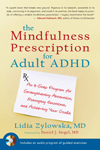Why go on retreat?
Great question! As a certified MBSR teacher and teacher trainer – for the UMass Center for Mindfulness and a mentor for the UCSD Mindfulness-Based Professional Training Institute (MBTI), I get asked this question more and more. If you look at the prerequisites for teaching MBSR or other MBI’s all over the world, the recommendation for personal retreat practice is consistent. To answer the question, I may start by quoting the originator of MBSR; Dr.
 UCSD Mindfulness-Based Professional Training Institute is now offering Mindfulness for ADHD: Training for Adults, Parents and Professionals. The training will take place August 7-10, 2014 at Earthrise Retreat Center in Petaluma, CA. The training is a retreat-version of the 8-week MAPs for ADHD that my colleagues and I originally developed at UCLA.
UCSD Mindfulness-Based Professional Training Institute is now offering Mindfulness for ADHD: Training for Adults, Parents and Professionals. The training will take place August 7-10, 2014 at Earthrise Retreat Center in Petaluma, CA. The training is a retreat-version of the 8-week MAPs for ADHD that my colleagues and I originally developed at UCLA.